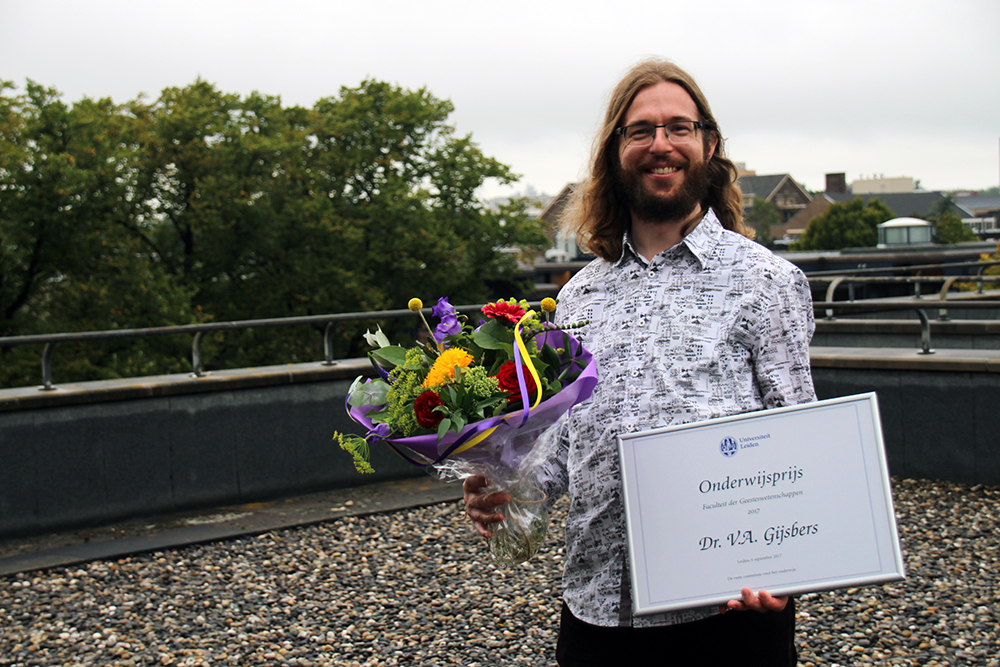
Florian Schneider on the success of his 'role-playing' teaching
Sinologist Florian Schneider was awarded the LUS Teaching Prize, officially making him this year’s best Leiden University lecturer. Schneider was commended for his innovative teaching methods based on role-playing.
Are you proud of having been voted best lecturer?
‘Absolutely. It was a very important moment for me. What moved me most was that I was nominated by my students. These past few weeks, so many of them have come to congratulate me that this prize really feels like a moment of recognition. I sometimes work 70 hours a week to create high-quality teaching, so I’m really glad my students noticed my efforts.
‘I have to admit I’m highly privileged to be able to spend so much time on my teaching; I have a very understanding wife and no children. In the current system, many researchers find it hard to make time for teaching. I’d like the dynamics to change, making it easier for lecturers to offer high-quality teaching.
‘I think the LUS Teaching Prize contributes to this change, because recognition is essential for lecturers. Researchers don’t get rewarded or promoted for teaching as much as for doing research. As a result, researchers devote most of their time to research, while our work is just as much about teaching.’

What makes you such a successful teacher?
‘I base my teaching method on the role-playing game Dungeons & Dragons. The idea behind role-playing games is that you create a character that collects Experience Points (XP) by acquiring certain skills. The more XP you have, the higher your game level. I use this in my lectures by giving students assignments that correspond to a number of XP, which in turn represent a grade.
‘This means my students know what they have to do to get a 6 or an 8. This creates a completely different learning experience. What I see is that students work harder when they feel in control of the outcome of their work. They don’t stop at a 6, but go for an 8 or higher. I try to make sure my lectures contain something for each type of student. Some students are strong cognitively, others emotionally or socially. We have to create a learning environment that integrates all of these qualities.
‘I also devote a lot of time to feedback. I give students lots of feedback on their assignments and advise them how to do better next time. This is one of the aspects of my teaching students seem to appreciate most.’

The Prize comes with a €25,000 teaching grant. What do you plan to do with this money?
‘I still have to hear back from the University whether my idea is feasible, since the prize money is subject to some rules. But my dream would be to write up my game-based teaching method and turn it into an open source textbook for lecturers and students. I want to adapt my approach for a variety of disciplines, so that other lecturers can use it.
‘I still have to figure out how much it costs to publish a textbook in open access; I believe it’s quite expensive. Ideally, I’d like to just offer it for free online to anyone who’s interested; I also want the book to be available to teachers in countries that are less prosperous than the Netherlands. But I still have to figure out whether the plan is feasible.
‘The book is primarily useful for lecturers who want to devote more time to teaching, because my teaching method is quite time-consuming. But I hope that one day the University will say: this is what we want, so we’re going to give lecturers enough time and resources to actively improve their teaching.’

More award-winning Humanities teaching
In addition to the University-wide LUS Teaching Prize, the Faculty of Humanities also has its own Faculty Teaching Prize. Lecturer in Philosophy Victor Gijsbers was the winner this year. Gijsbers was praised for the energy and humour he puts into his lectures on the Philosophy of Science.
